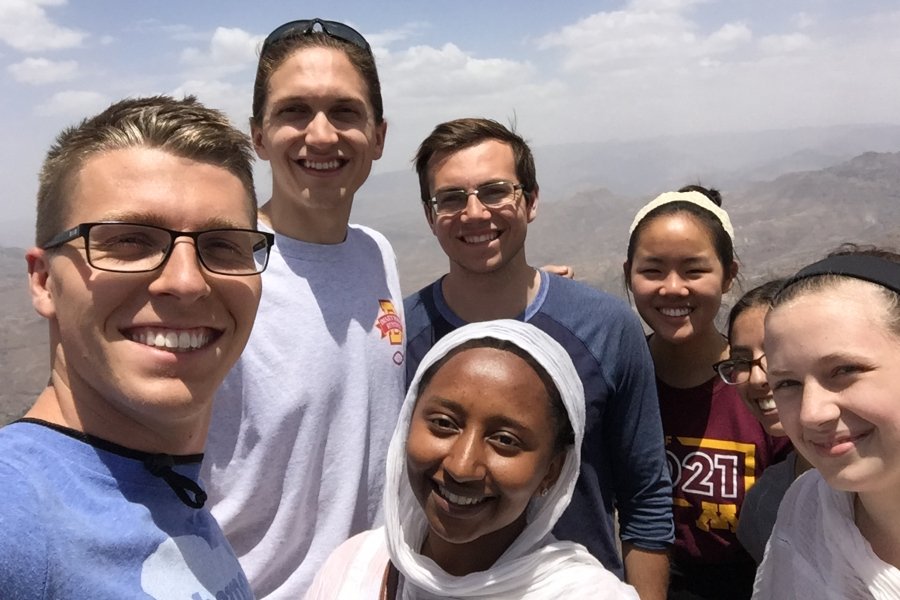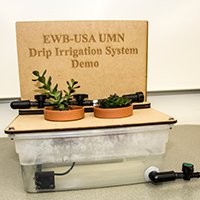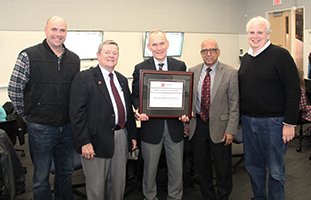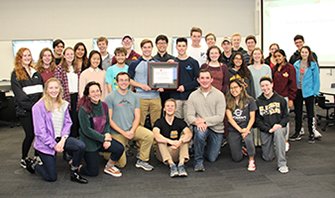UPDATE: NCEES Award presented to EWB by Board Chair Nirmal Jain

Fall 2018 update as reported by Minnesota Board of AELSLAGI.
Each year, the National Council of Examiners for Engineering and Surveying (NCEES), of which the Board is a member, names Engineering Education Award winners. This October, Board Chair Nirmal Jain, PE, and Immediate Past Chair Dennis Martensen, PE, were please to present on behalf of NCEES an award to the Department of Civil, Environment, and Geo-Engineering (CEGE) at the University of Minnesota-Twin Cities. The students and their university advisors and professional mentors won for their project, a multistage drip irrigation system. The group designed and installed the system for the 500-person community of Filakit Geregera, Ethiopia. Prior to the building of the irrigation system, multiple farm fields went uncultivated due to the inability to supply them with water during the dry season.



UMN awarded $10,000 to support Engineers Without Borders (EWB)
UMN students led the way in designing and documenting their EWB project in Ethiopia to win a national competition. As a result of their efforts, CEGE received a $10,000 Engineering Education Award from the National Council of Examiners for Engineering and Surveying (NCEES). The students’ project, Multistage Drip Irrigation System in Ethiopia, is part of a multi-year program to improve the economic standing and the nutrition of all residents, especially children, in the 500-person community of Filakit Geregera, Ethiopia.
A team of EWB students and two professional mentors traveled to Ethiopia in May and successfully completed the first phase of project implementation.
Engineers Without Borders taps professional engineers to work with communities in some of the world’s toughest places to meet basic human needs. EWB involves the communities in determining needs, solving problems, implementing solutions, and establishing ongoing, community-based maintenance.
The current project of the University’s student chapter of EWB aims to improve the economic standing and the nutrition of all residents, especially children, in the community of Filakit Geregera, Ethiopia, where malnutrition is one of the chief concerns. During much of the year, the community of Filakit Geragera has insufficient irrigation capacity to utilize all of its fields. The local government is threatening to repossess these lands if the situation remains unchanged. The student-led EWB project team partnered with the people of Filakit Geragera to address these problems.
One of the biggest problems the community faces is utilizing all of their tillable land and supplying enough food to meet the demands of the community’s population during the dry season. It was decided that an effective irrigation system could help address this issue. The current project is to design an irrigation system that would allow the community to make use of limited water supply during the dry season. The Multistage Drip Irrigation System for Inclined Fields in Ethiopia project is one portion of an extensive water distribution system that also involves components for household and drinking water.
Twelve students from CEGE are currently members of UMN EWB: Brian Aeling, Tim DeCesare, Abby Desa, Lily Hock, Andrew Kanewske, Grace Keller, Emily Lowerr, Jack Olsson, Benjamin Ontl, Niki Spence, Vinicius Taguchi, and John Wiebolt. Other team members come from chemical engineering, mathematics, and mechanical engineering. The team is co-advised by Paul Capel, Adjunct Associate Professor in CEGE, and Matt Simcik, Associate Professor, in the School of Public Health.
The student team also works closely with the community and with an NGO partner, a local monastery. The monastery is a foundational organization within the community and acts as both a funding partner and community-based partner.
2016. The multi-year project began in 2016 when EWB Ethiopia team first got in contact with the community of Filakit Geregera in Ethiopia.
Summer 2017. A group of UMN students traveled to Filakit Geregera for the first time on an assessment trip. The team surveyed the community and the surrounding farmland using traditional surveying tools. Students learned to use nutrient and pH test kits to test the fields. Most importantly, the students learned to apply design principles to assess the complex problems the community faces, and to address the most pressing needs before designing solutions.
The community granted the project team access to one of their agricultural fields to work on improving irrigation methods. Upper Field, as the section is called, is currently not utilized due to the challenge of watering. The field is 80 feet wide and 140 feet long; it slopes downward along the length of the field. The nearest water supply, a natural spring, is roughly 2,000 feet away, and it lies 250 feet lower in elevation.
Fall 2017. The post-assessment phase took place from August to December back on campus. Students analyzed the data collected on the assessment trip. The post-assessment phase included an alternatives analysis in which the students researched positive and negatives aspects of potential solutions using a SWOT analysis (an analysis of strengths, weaknesses, opportunities and threats) and a Pugh Chart (a qualitative technique used to rank the multi-dimensional options). Various irrigation methods were compared, including drip irrigation, spray irrigation, sprinkler irrigation, and deep pipe irrigation.
A four-student design team determined that a drip irrigation system would minimize water loss from evapotranspiration while still meeting the field’s water demands. However, the mountainous terrain makes a normal gravity fed drip irrigation system impractical. Additional challenges included the lack of power in the region and the community’s distance from major markets. To overcome these challenges, students designed a gravity drip irrigation system that uses a set of towers, each tower feeding a set of drip lines that run perpendicular to the slope of the field. This multi-tower design allows for effective use in an inclined situation without relying on a pressurized water pipe system.
Spring 2018. Team members performed a thorough stress analysis of the drip system irrigation towers with the help of a professional mentor. Students built a full-scale water tower prototype, hands-on experience that was extremely valuable for the undergraduate students. Student members also created an itemized materials budget and worked to source the materials needed for implementation. Much of the pre-implementation phase involved students improving their technical writing skills through the composition of a formal pre-trip plan, which involved a comprehensive description of the stage one implementation trip. The project team finalized the system’s design, budget, and construction plans in April and May of 2018.
Summer 2018. In May, a team of EWB students and two professional engineer mentors traveled to Filakit Geragera, Ethiopia, and successfully prototyped the entire drip irrigation system. The team was not able to complete the system last May, as wood prices were much higher than anticipated. The team is currently redesigning the drip irrigation towers to use community-sourced wood that is more economical and easier for the community to maintain.
The long-term, community-centered approach that EWB takes works well for communities and for students. Many students can get involved in doable and worthwhile aspects of each project. Students gain valuable technical skills and hands-on experience. In addition, working with community members whether here or abroad, students grow in cultural understanding and learn communication, teamwork, and professionalism. Each person with whom the students interact and each aspect of the process offers such opportunities. Students experience professional success and see the positive impacts that they can have through their careers as a civil, environmental, or geo- engineers.